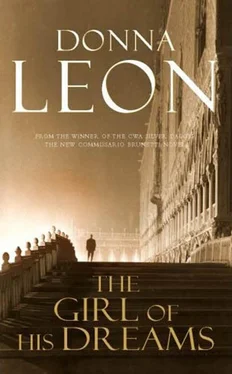'And without your wife's suggestion?' the priest enquired, and the astuteness with which he asked the question made Brunetti revise his assessment of this man as perhaps feeble of mind as well as hearing.
Brunetti gave something that was meant to resemble a shrug and then, as though suddenly conscious of how rude this might appear, he said, 'It's the correct thing to do, Padre. He was at school with my brother, and so someone from the family should thank him.'
'And your brother?' the old man asked.
Making an attempt to look evasive, Brunetti said, 'My brother couldn't come, so he asked me to.'
‘I see, I see,' the priest answered and staring at his own hands, one of which, Brunetti noticed only now, held a rosary. He looked up and asked, 'Was there no time at the funeral?'
'Well, we were all a bit… how shall I say this? We were distracted, and so when we got back to Sergio's house we realized that none of us had thought to invite him along with us.'
'But if he said the Mass, wouldn't he have been invited?' the old man asked.
Brunetti did his best to look embarrassed. 'My mother's parish priest said the Mass, Padre. Padre Scallon,' he said, referring to him formally, 'was at the cemetery, and he gave a blessing there.'
'Ah, I understand now’ the priest said. 'So you'd like to thank him for giving the blessing?'
'Yes. But if he's not here, perhaps I could come back’ Brunetti suggested, though he had no intention of doing so.
'You could leave him a note’ the old man said. ‘I know, I know. I could have done that. But it was a sign of respect for our mother for him to come, and
so… ‘ Brunetti let his voice trail off. ‘I hope you can understand, Padre’
'Yes’ he said with a smile that enveloped Brunetti in its sweetness, 'I think I can understand that.' He lowered his head, and Brunetti saw a few of the beads pass through his fingers. Then he looked back at Brunetti and said, ‘It's strange, the death of our mothers. It's usually one of the first funerals we go to, and at the time I'm sure we think it's the worst. But if we're lucky, then it turns out to be the best.'
Brunetti let some time pass then said, 'I'm not sure I follow you, Padre.'
'If we were lucky, then all we'll have is good memories and not painful ones. I think it's easier to let someone go when that's true. And we usually have good memories of a mother. If we're luckier still, we were good to them and don't have anything to reproach ourselves with: often, that's so.' When Brunetti did not speak, he asked, 'Were you good to yours?'
Brunetti, having deceived this man about Antonin, owed him the truth at least about this, and so he said, 'Yes. I was good to her. But now that she's gone, I keep thinking that I wasn't good enough.'
The priest smiled again and said, 'Oh, we're never good enough to anyone, are we?'
Brunetti restrained the impulse to put his hand on the old man's arm. Instead, he asked, 'Am I correct in thinking that you have some reservations about Antonin, Padre?' Before the priest could answer, Brunetti said, 'I'm sorry if I put it that way: I don't want to create an awkward situation for you. You don't have to answer: it's none of my business, really'
The priest thought this over and then surprised
Brunetti by saying, If I have any reservations, my son, it's about you and why you're trying so hard to disguise this interrogation.' He smiled, as if to sweeten his words, then added, 'You ask questions about him, but it seems to me that you've already made up your mind about him.'
After a brief pause the old man went on. 'You seem like an honest man, so it confuses me that you come here and ask about him in this way, with a suspicion you try to hide.' Almost as if a light had been turned on behind them, the priest's eyes had taken on a new intensity. 'May I ask you one thing, my son?'
'Of course,' Brunetti answered, meeting the old man's eyes but wanting to look away.
'You don't come from Rome, do you?'
Given that they were carrying on the conversation in Veneziano, the question puzzled Brunetti, who replied, 'No, of course not. I'm Venetian. Like you.'
The priest smiled, either at Brunetti's claim or at the intensity of it.
'No, I don't mean that, my son. I hear it in every word you say. I mean do you represent Rome?'
'You mean the government?' Brunetti asked, confused.
It took the priest some time before he said, 'No, the Church.'
'Me?' Brunetti asked, scandalized.
The old priest smiled, gave a snort of laughter, tried to stifle the sound, but then gave in and put his head back and started to laugh. The sound was remarkably deep, like water running in a far-off pipe. He leaned across and patted Brunetti's knee, still laughing, then fought for a moment until he could control himself. 'I'm sorry, I'm sorry, my son,' he said at last, then pulled up the bottom of his scapular and wiped tears from his eyes. 'But you do have the air of a policeman, so I thought you might be from them.'
‘I am a policeman,' Brunetti said, 'but a real one.'
For some reason, this set the priest laughing again, and it was some time before he stopped, and more time before Brunetti had explained fully the reason for his curiosity about Antonin. Brunetti realized he was now just as curious about the reason for the old priest's suspicions of him as he was about Antonin.
A comfortable silence fell between them after Brunetti had stopped speaking, until finally the old man said, 'He is a guest in my home, and so I have towards him the obligation of a host.' From the way the priest spoke, Brunetti had no doubt that he would defend his guest with his life, should that be necessary. 'He was sent back from Africa amidst circumstances which were not made clear. The official documents I received telling me that Padre Antonin' – Brunetti was conscious of the warmth with which the old man now used the first name – 'would be my guest made it clear that he is considered to be in disgrace by the people who sent him.'
He paused, as if inviting questions. When Brunetti asked none, he went on. 'He has been with me for some time now, and I have seen nothing that would explain that opinion. He is a decent and kind man. Perhaps he is too convinced of the lightness of his judgements, but that is something that can be said of most of us, I'm afraid. As we get older, some of us become less certain about what we think we know.'
'Apart from the certainty that we're never good enough to anyone?' Brunetti asked.
'That surely.'
Brunetti took this as the admonition it so clearly was and nodded in agreement. He saw that exhaustion had slipped into the room and taken its place in the old man's eyes and mouth.
'I would like to know how much he is to be trusted’ Brunetti suddenly said.
The old man shifted his weight to one side of the chair, and then to the other. He was so frail that it was more a matter of shifting bones and the cloth that covered them. ‘I believe he deserves not to be distrusted, my son,' the priest said, and then added, looking secretly gleeful when he said it, 'but at my age that's advice I give about almost everyone, and to almost everyone.'
Brunetti proved incapable of resisting the temptation to ask, 'Unless they come from Rome?'
The old priest's face grew serious and he nodded.
'Then I'll take your advice as given,' Brunetti said, getting to his feet. 'And thank you for giving it to me.'
As he continued on the way to the Questura, Brunetti considered what the priest had told him. Decades of exposure, not only to criminality, but to the daily business of life, had worn from Brunetti the capacity for instinctive trust. Perhaps, like the Contessa's faith and in the face of experience, it was something a person had to choose.
Читать дальше





![Theresa Cheung - The Dream Dictionary from A to Z [Revised edition] - The Ultimate A–Z to Interpret the Secrets of Your Dreams](/books/692092/theresa-cheung-the-dream-dictionary-from-a-to-z-r-thumb.webp)






